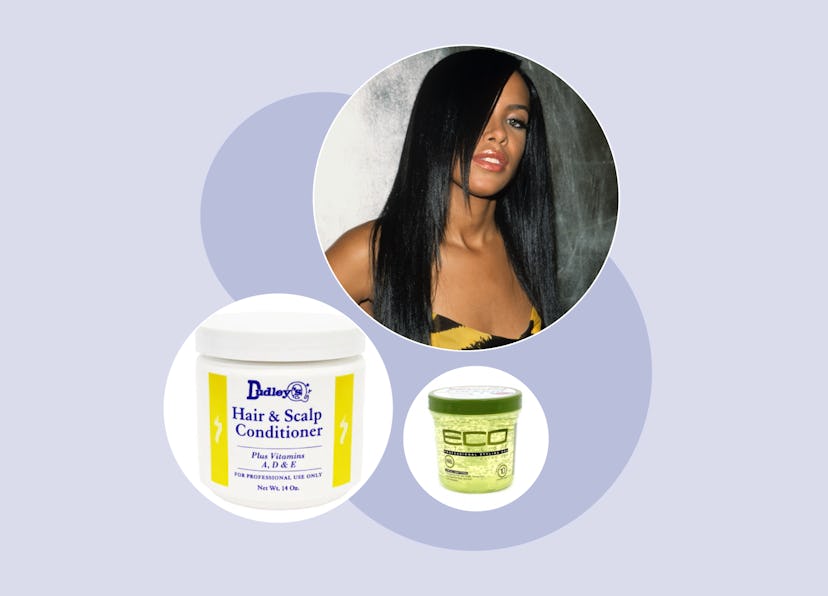Iconic Hair
Cult Black Hair Products That Will Go Down In Beauty History
Dudley’s walked so Mielle could run.

Defining what makes a beauty product reach “cult” status is an imperfect science. Does it come after we can look back with (somewhat) fond memories? Or is it something unintentionally assigned by the people lapping up a new launch at light speed? With beauty always growing, even a TikTok-viral product that sells out immediately seems like only a flashing moment in time. Still, when you come across a beauty product worthy of idolization, you can somehow always recognize it.
This eerie skill becomes particularly clear when taking stock of Black hair products. Unlike other, forever exploding beauty niches, textured hair products remain a relatively young category. A history of fewer options, yet highly popular hair trends, has pushed certain products beyond cult status into a collective Black memory. We’re just now beginning to see a change of the guard when it comes to the products everyone seems to put their faith in. Bustle spoke with seasoned hair stylists and experts about which cult products have recently passed on the badge of honor.
The Cult Brand
Then: Dudley Beauty Now: Mielle Organics
Dudley Beauty became one of the earliest cult Black hair brands after sending door-to-door salesmen through Greensboro, North Carolina’s Black neighborhoods in the ‘70s. Word of mouth quickly spread throughout the country, solidifying Dudley as a Black household name.
The natural hair movement of the early 2000s positioned brands like SheaMoisture, Carol’s Daughter and Miss Jessie’s for a similar ascent. “They specifically, spoke to the Black woman with natural hair,” says Monae Everett, celebrity hairstylist and artistic director at Blushington. “[They] celebrated how beautiful your individual curls and coils were when no one else was saying look how beautiful you are.” Among the newest cohort of natural haircare brands, Mielle Organics recently demonstrated the power of cult-like support. In early 2023, Proctor & Gamble acquired Mielle making it one of few Black-owned, haircare brands ever to be sold.
The Cult Style
Then: Relaxers Now: Braids and Extensions
Popular hairstyles of the ‘90s called for straight hair, waving in the era of chemical relaxers. “We wore different haircuts. We wore the asymmetrical, Salt-N-Pepa cut where you shaved one side off and wore the other side long,” celebrity hairstylist and founder of Contents Haircare, Cheryl Bergamy-Rosa. “So you had to have a relaxer. You had the finger waves, pump waves, crunch waves and pineapple waves. You had all these different styles and it required you to wear [straight hair].”
As wearing natural curls returned to favor, methods for avoiding heat styling did as well. So much so that hair extensions have transformed into a product category of their own. Innovation around production, like with Rebundle’s plant-based extensions, styles and installation trends offer a new wealth of style solutions for textured hair.
The Cult Gel
Then: Ampro Pro Styl Protein Gel Now: Eco Style Olive Oil Gel
When creating slick ponytails, gathered updos and even braids, you need a good gel. Ampro’s recognizable black jelly was once the most popular for its versatility. “We lived in Ampro gel,” says Everett. “When you went to the beauty supply you always saw women standing at that product.” Slowly, Eco Style began to take over as the reigning gel of choice for curly and textured hair. “One thing people didn’t like about Ampro was the brown residue it left behind,” suggests Everett. “[Eco Style] was able to swoop in and market to the new natural hair bloggers.”
The Cult Cream
Then: Luster’s Pink Oil Moisturizer Lotion Now: SheaMoisture Coconut & Hibiscus Curl Enhancing Smoothie
Accessibility continues to govern which brands receive a textured hair stamp of approval. Luster’s Pink Lotion is one of the most memorable textured hair creams of the past 50 years, as demonstrated by each hairstylist referencing it in their list of cult Black beauty products. Celebrity hairstylist Lacy Redway, who’s coiffed the likes of Tracee Ellis Ross and Lupita Nyong’O, remembers having limited access to hair products during her early childhood in Jamaica, yet still being impacted by the product. “We used what we had access to,” she says. “Luster’s Pink Lotion was a staple in my Black experience.”
Today, SheaMoisture is not only a cult hair brand, but arguably churns out some of the most beloved products. Despite releasing in 2014, the brand’s Coconut & Hibiscus Curl Enhancing Smoothie continues to be among its most popular. “One of the tried-and-true products that still make it in my kit today is Shea Moisture Coconut & Hibiscus Curl Enhancing Smoothie,” says Redway.
The Cult Tool
Then: Flat Irons Now: Edge Stylers
“[The flat iron] is arguably the most versatile tool you can have in your arsenal,” says Everett. Flat irons and other hot tools have endured throughout the years, and Everett doesn’t see them going anywhere. However, edge-tamer brushes are quietly making a name for themselves. Until recently, styling baby hair was achieved using toothbrushes and non-specific tools. New, dedicated edge brushes from brands like Baby Tress and Pattern Beauty illustrate the impact of Black hair needs.
A growing number of textured hair options may seem to threaten the cult formula that previously allowed products to have a widespread influence. However, the experts believe a constantly shifting focus still leaves cult spots open for the taking. “We are going more clean, we're going more holistic,” says Bergamy-Rosa. “There's going to be so many new products that we have so much more to do as far as their evolution is concerned.”
This article was originally published on